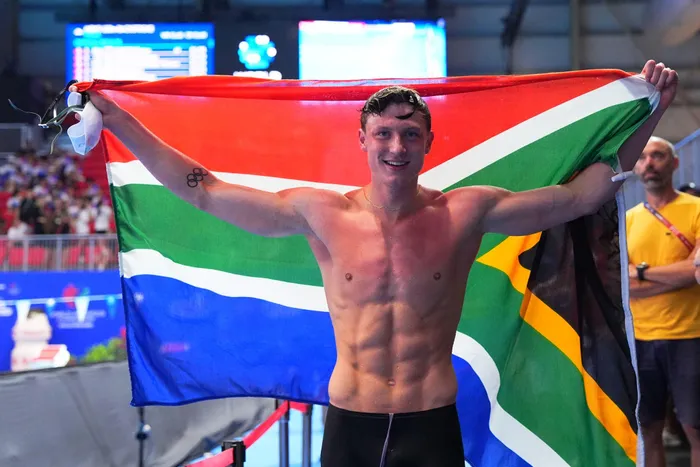The ripples from Pieter Coetzé's Singapore heroics could soon be felt in LA
Swimming

Pieter Coetzé celebrates winning gold in the 100m backstroke final at the World Aquatics Championships in Singapore.
Image: World Aquatics
The emergence of recently crowned 100m world backstroke champion Pieter Coetzé as one of the best swimmers in the world right now has given the country’s medal prospects in the pool at LA 2028 a major boost.
The 21-year-old Tuks psychology student in Pretoria is fresh from becoming the only man to reach the podium in all three backstroke events at the World Aquatics Championships in Singapore, which featured the cream of the world’s swimming talent.
Coetzé powered his way to South Africa’s first medal of the championships, claiming gold in the 100m backstroke. He fought off Olympic champion Thomas Ceccon and France’s Yohann Ndoye-Brouard in the second half of the final to reach the wall in a sensationally quick new African record time of 51.85 seconds. His time was just 0.25 seconds off Ceccon’s world record.
It was also faster than Ceccon’s gold-winning time from last year’s Olympic Games in Paris.
“I always thought it would happen eventually,” admitted Coetzé afterwards during his poolside TV interview. “In my mind, it was just a matter of time – but to do it this year is amazing.”
Olympic 200m backstroke champion Hubert Kós was relegated to fourth in the 100m, but the Hungarian would enjoy a measure of revenge in the 200.
The Pretoria swimmer went out hard in the final, turning first at both the 50m and 100m marks under world record pace, but was hunted down in the second half of the race by Kós.
While Coetzé closed in on the Hungarian in the final metres, he just couldn’t out-touch him, finishing second in 1:53.36 – just 0.17 seconds off the gold. That time took almost a second off the African record he had set in the semi-finals and now ranks as the seventh-fastest 200m backstroke swim in history.
Faster than Paris
Both Kós and Coetzé’s times were faster than the Hungarian’s gold medal-winning swim at the 2024 Paris Olympics.
The tall and powerfully built South African then sealed his final medal of the world champs – silver in the 50m backstroke, a result that even took him by surprise.
Coetzé lined up for the 50m final as the third-fastest qualifier behind two Russians – world record-holder Kliment Kolesnikov and Pavel Samusenko – having set an African record in the semi-finals.
He went even quicker in the final, powering across the pool in another continental record of 24.17 seconds to share the silver with Samusenko, who touched in exactly the same time. Kolesnikov took gold in a championship record of 23.68.
“I’m very happy. I don’t really train for the 50 – I train for the 200 – so to be able to go down so far and win a medal in the 50 is amazing,” said a thrilled Coetzé afterwards.
Kaylene Corbett also claimed a bronze medal in the women’s 200m breaststroke, lifting South Africa to eleventh in the medals table in Singapore.
Proud tradition
The pool has been a consistent source of Olympic medals for Team SA in recent history.
Tatjana Smith won gold in the 100m breaststroke and silver in the 200m at the Paris Games. That took her Olympic tally to four – two gold and two silver – making her South Africa’s most decorated Olympian.
You would have to go back to the 2016 Rio Olympics for the last time a South African male swimmer won an Olympic medal: Chad le Clos’ silver in the 100m butterfly.
Others have flown the SA flag high at the Games, including Cameron van der Burgh, Roland Schoeman, Lyndon Ferns, Darian Townsend and Ryk Neethling.
There is still a long way to go until the LA Games in 2028, but Coetzé’s rise has given the nation hope that his name can be added to that illustrious list. On current form – and considering his age – there is every reason to be optimistic.
His medal heroics in Singapore will only fuel belief that Coetzé can take on and beat the world’s best.
His breakthrough is also expected to have a ripple effect on South Africa’s rising swim stars, so more names could well be added to the country’s medal hopefuls as LA 2028 draws closer.
Related Topics: